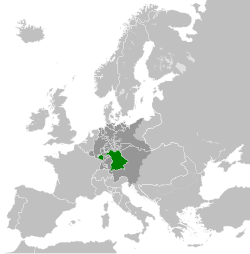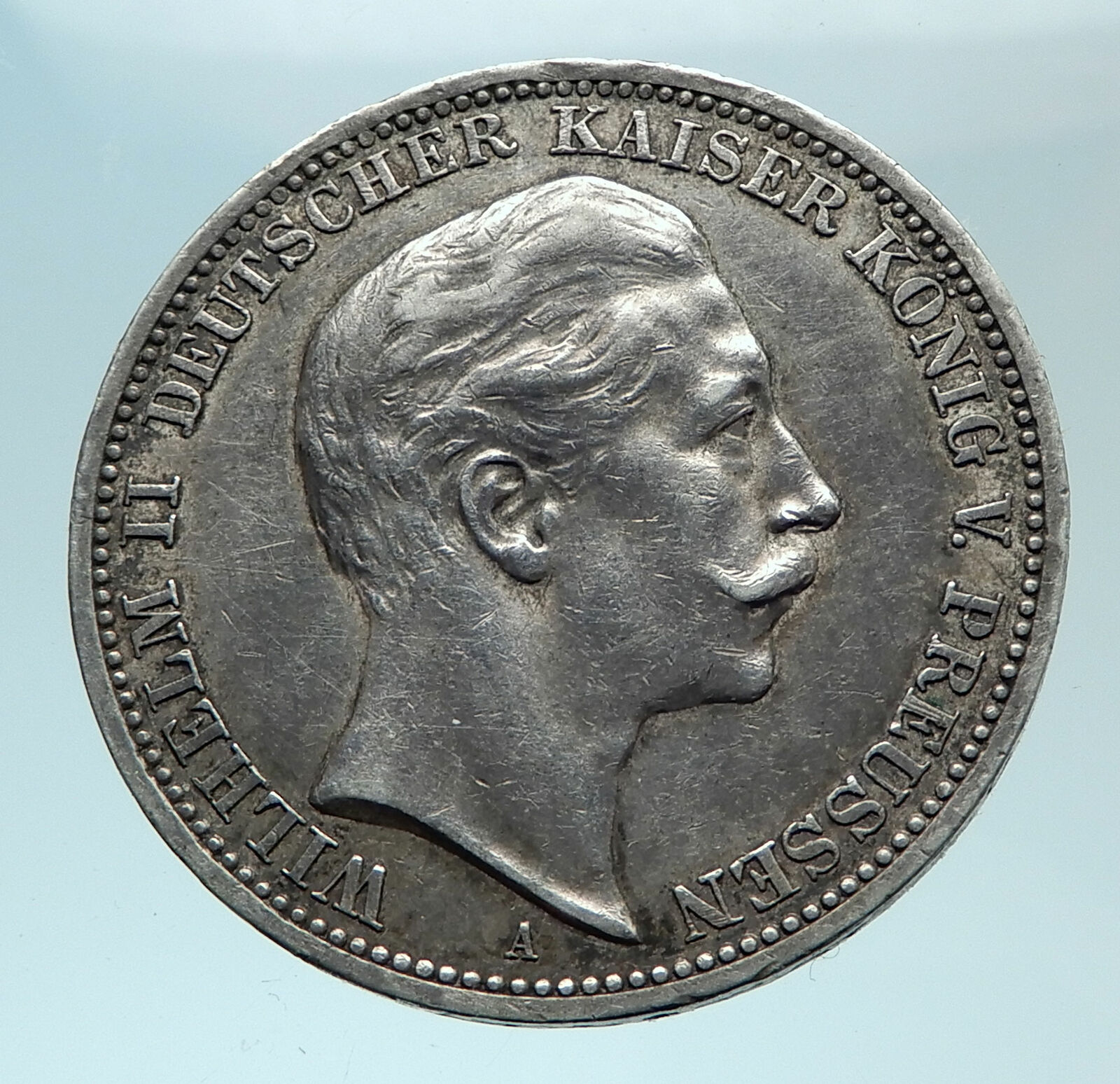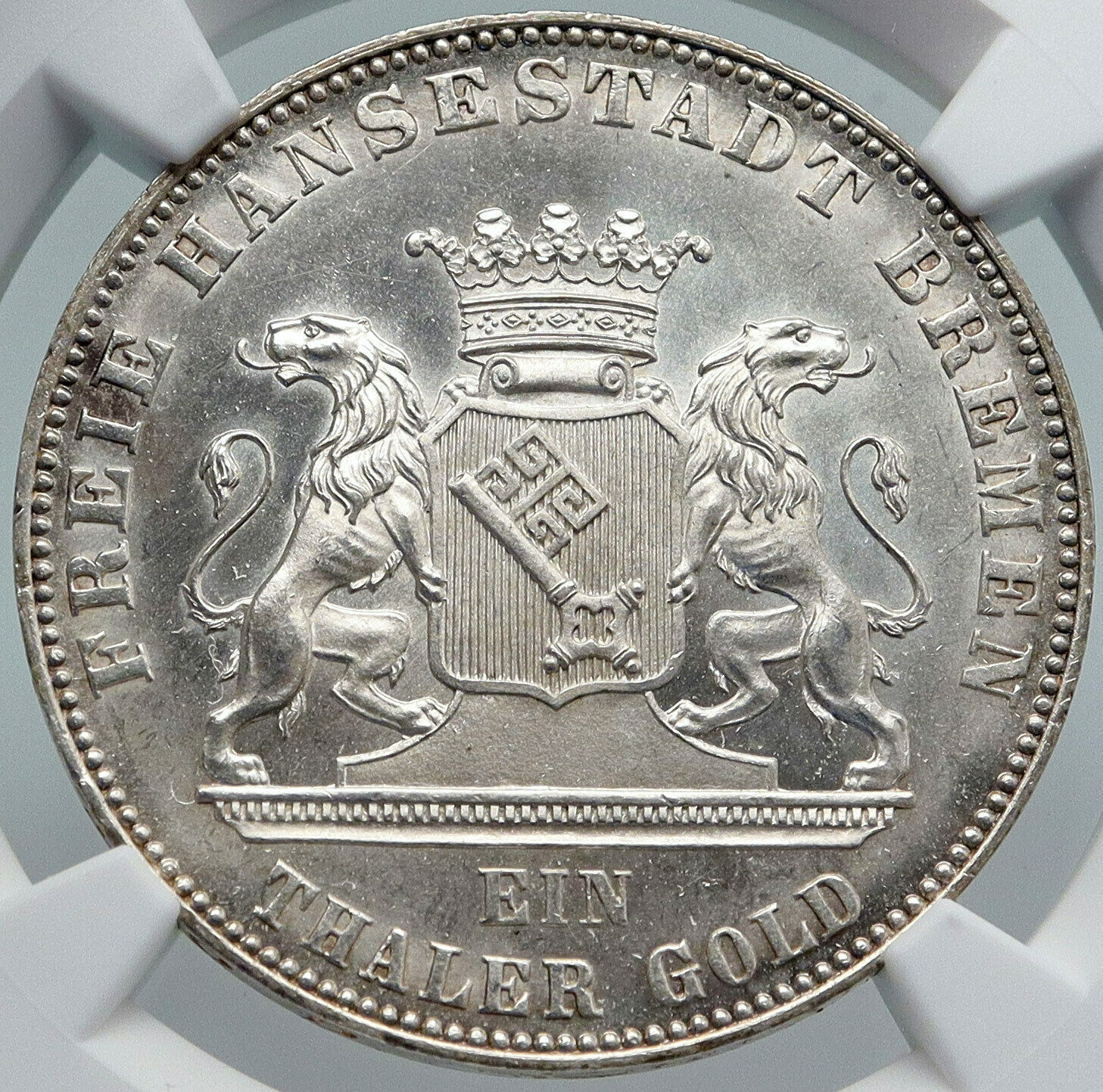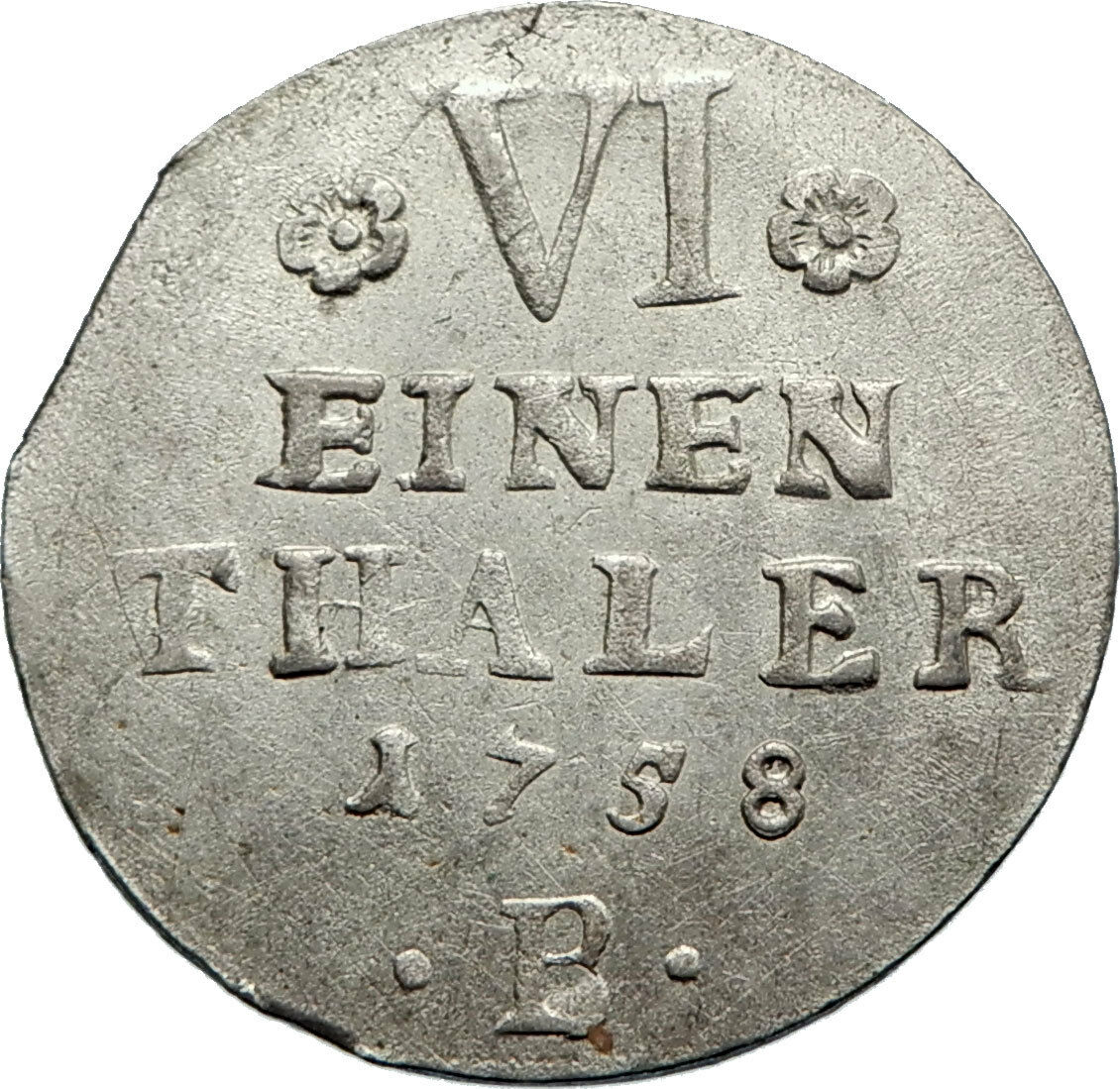|
Germany. German States. Bavaria
Otto – King of Bavaria: 13 June 1886 – 5 November 1913
1908 D Silver 3 Mark 33mm (16.67 grams) 0.900 Silver (0.4823 oz. ASW)
Reference: KM# 996
Certification: NGC MS 63 2835237-009
OTTO KOENIG VON BAYERN D, Head of Otto facing left.
DEUTSCHES REICH * DREI MARK *, Eagle with crown over head.
Edge Lettering: GOTT MIT UNS
You are bidding on the exact item pictured, provided with a Certificate of Authenticity and Lifetime Guarantee of Authenticity.
 The Kingdom of Bavaria (German: Königreich Bayern; Austro-Bavarian: Kinereich Bayern) was a German state that succeeded the former Electorate of Bavaria in 1805 and continued to exist until 1918. The Bavarian Elector Maximilian IV Joseph of the House of Wittelsbach became the first King of Bavaria in 1805 as Maximilian I Joseph. The crown would go on being held by the Wittelsbachs until the kingdom came to an end in 1918. Most of Bavaria’s present-day borders were established after 1814 with the Treaty of Paris, in which Bavaria ceded Tyrol and Vorarlberg to the Austrian Empire while receiving Aschaffenburg and Würzburg. With the unification of Germany into the German Empire in 1871, the kingdom became a federal state of the new Empire and was second in size, power, and wealth only to the leading state, the Kingdom of Prussia. In 1918, Bavaria became a republic, and the kingdom was thus succeeded by the current Free State of Bavaria. The Kingdom of Bavaria (German: Königreich Bayern; Austro-Bavarian: Kinereich Bayern) was a German state that succeeded the former Electorate of Bavaria in 1805 and continued to exist until 1918. The Bavarian Elector Maximilian IV Joseph of the House of Wittelsbach became the first King of Bavaria in 1805 as Maximilian I Joseph. The crown would go on being held by the Wittelsbachs until the kingdom came to an end in 1918. Most of Bavaria’s present-day borders were established after 1814 with the Treaty of Paris, in which Bavaria ceded Tyrol and Vorarlberg to the Austrian Empire while receiving Aschaffenburg and Würzburg. With the unification of Germany into the German Empire in 1871, the kingdom became a federal state of the new Empire and was second in size, power, and wealth only to the leading state, the Kingdom of Prussia. In 1918, Bavaria became a republic, and the kingdom was thus succeeded by the current Free State of Bavaria.
 Otto (German: Otto Wilhelm Luitpold Adalbert Waldemar; 27 April 1848 – 11 October 1916) was King of Bavaria from 1886 to 1913. However, he never actively ruled because of alleged severe mental illness. His uncle, Luitpold, and his cousin, Ludwig, served as regents. Otto (German: Otto Wilhelm Luitpold Adalbert Waldemar; 27 April 1848 – 11 October 1916) was King of Bavaria from 1886 to 1913. However, he never actively ruled because of alleged severe mental illness. His uncle, Luitpold, and his cousin, Ludwig, served as regents.
Ludwig deposed him in 1913, a day after the legislature passed a law allowing him to do so, and became king in his own right.
Otto was the son of Maximilian II and his wife, Marie of Prussia, and the younger brother of Ludwig II. He is not to be confused with King Otto of Greece, his uncle and godfather.
Childhood and youth
Prince Otto was born on 27 April 1848, two months premature, in the Munich Residenz. His parents were King Maximilian II of Bavaria and Marie of Prussia. His uncle, King Otto I of Greece, served as his godfather.
Otto had an older brother, Crown Prince Ludwig. They spent most of their childhood with servants and teachers at Hohenschwangau Castle. Their parents were distant and formal, and they were at such a loss about what to say to Otto and Ludwig that they often ignored and even avoided them.[1] Their mother took an interest in what the brothers wore: she ordered for Ludwig to be always dressed in blue and for Otto to wear always red. Their father was strict with the brothers, particularly Ludwig, the heir apparent. Between 1853 and 1863, the brothers spent their summer holidays at the Royal Villa in Berchtesgaden, which had been specially built for their father.
Otto served in the Bavarian army from 1863. He was appointed sub-lieutenant on 27 April 1863 and admitted to the Cadet Corps on 1 March 1864. On 26 May 1864, he was promoted to full lieutenant.
On 10 March 1864, Otto’s father died and his brother, Ludwig, succeeded as King of Bavaria. Between 18 June and 15 July 1864, the two brothers received state visits by the emperors of Austria and Russia.
Otto was promoted to Captain on 27 April 1866 and entered active military service in the Royal Bavarian Infantry Guards. He participated in the Austro-Prussian War of 1866 and as colonel in the Franco-Prussian War of 1870-1871. His experiences on the battlefield traumatized him and caused him to suffer from depression and insomnia. When Wilhelm I was proclaimed German Emperor on 18 January 1871 at the Palace of Versailles, Prince Otto and his uncle, Luitpold, represented King Ludwig II, who refused to participate. Otto then criticized the celebration as ostentatious and heartless in a letter to his brother. Ludwig and Otto despised their ambitious Prussian relatives and cordially disliked their Prussian mother and so they were appalled by the creation of the new German Empire. The hostility of both was no secret to the Prussian government.
Otto and Ludwig were often seen together during the early years of Ludwig’s reign, but they became estranged over time. Ludwig was shy and introverted and eventually became a recluse. Otto was cheerful, outgoing and extroverted until the Franco-Prussian War. In 1868, Otto received the Royal Order of Saint George for the Defense of the Immaculate Conception, the house order of the House of Wittelsbach. In 1869, he joined the Order of the Holy Sepulchre, on the initiative of Cardinal Karl-August von Reisach.
Mental incapacity
After the Franco-Prussian War, Otto became very depressed and anxious, which worried his family. Otto had spells during which he slept poorly for days and acted out followed by periods of time during which he was perfectly normal and lucid. His illness progressively grew worse. Ludwig was horrified because he had been counting on Otto to marry and have a son who could eventually inherit the throne. Otto was placed under medical supervision, and reports about his condition were sent by spies of Prussian Chancellor, Otto von Bismarck. Doctors reported that Otto was mentally ill in January 1872. From 1873, he was held in isolation in the southern pavilion of Nymphenburg Palace. His attending physician was Dr. Bernhard von Gudden, who later diagnosed Otto’s brother, Ludwig, as mentally ill without bothering to examine him and without asking him a single question, which raises questions about his competence and his motives. Both Ludwig and Otto despised Prussia, and their uncle, Luitpold, and Gudden supported Prussia’s rise to dominance. Some contemporaries believed that Gudden’s diagnoses of Otto and Ludwig were motivated by political considerations and that more could and should have been done to help and treat Otto. Some contemporaries also believed that Bismarck did not want Ludwig or Otto to remain in power and decided to replace the brothers with their malleable uncle, Luitpold.
During Corpus Christi Mass in 1875 in the Frauenkirche in Munich, Otto, who had not attended the church service, rushed into the church wearing hunting clothes and fell on his knees before the celebrant, Archbishop Gregor von Scherr, to ask forgiveness for his sins. The High Mass was interrupted, and the prince did not resist when he was led away by two church ministers. Otto was then moved to Schleissheim Palace and was effectively held prisoner there, much to his dismay. Gudden made no effort to treat him; it is possible that Otto was heavily drugged. Otto’s last public appearance was his presence at the side of his brother at the King’s parade on 22 August 1875, at the Marsfeld in Munich. From 1 June 1876, he stayed for a few weeks in the castle at Ludwigsthal in the Bavarian Forest. In the spring of 1880, his condition worsened. In 1883, he was confined under medical supervision in Fürstenried Palace near Munich, where he would remain for the rest of his life. The palace had been specially converted for his confinement. Ludwig occasionally visited him at night and ordered for no violence to be used against him.
Otto became king after Ludwig died, but he was never truly allowed to reign. In 1886, the senior royal medical officer wrote a statement declaring that Otto was severely mentally ill. It has been claimed that Ludwig had a schizotypal personality disorder and that Otto suffered from schizophrenia. It has also been persuasively argued that Otto’s problems were the result of contracting syphilis, which would also account for his physical problems, particularly the paralysis from which he suffered from in later years.
King of Bavaria
On 10 June 1886, the Bavarian cabinet declared King Ludwig II unable to rule and appointed his uncle, Luitpold, as Prince Regent. Ludwig died only three days later under unexplained circumstances. That meant that Otto became king on 13 June 1886. He was, however, unable to rule. The official explanation “the King is melancholic”. The proclamation of his inauguration was read to him at Fürstenried Castle the next day, but he failed to understand it.
End of reign and death
Luitpold kept his role as Prince Regent until he died in 1912 and was succeeded by his son Ludwig, who was Otto’s first cousin. By then, it had been obvious for some time that Otto would never emerge from seclusion or be mentally capable of actively reigning. Almost as soon as Ludwig became regent, elements in the press and larger society clamoured for Ludwig to become king in his own right.
Accordingly, the constitution of Bavaria was amended on 4 November 1913 to include a clause specifying that if a regency for reasons of incapacity lasted for ten years, with no expectation that the King would ever be able to reign, the Regent could end the regency, depose the King and assume the crown himself with the assent of the legislature. The following day, Prince Regent Ludwig ended the regency and proclaimed his own reign as Ludwig III. The parliament assented on 6 November, and Ludwig III took the constitutional oath on 8 November. King Otto was permitted to retain his title and honours for life.
Otto died unexpectedly on 11 October 1916 from a volvulus (an obstruction of the bowel). His remains were interred in the crypt of the Michaelskirche in Munich. Bavarian tradition caused the heart of the king to be placed in a silver urn and sent to the Gnadenkapelle (Chapel of the Miraculous Image) in Altötting, beside those of his brother, father and grandfather.
 Germany, officially the Federal Republic of Germany, officially the Federal Republic of  Germany is a federal parliamentary republic in western-central Europe. It includes 16 constituent states and covers an area of 357,021 square kilometres (137,847 sq mi) with a largely temperate seasonal climate. Its capital and largest city is Berlin. With 81 million inhabitants, Germany is the most populous member state in the European Union. After the United States, it is the second most popular migration destination in the world. Germany is a federal parliamentary republic in western-central Europe. It includes 16 constituent states and covers an area of 357,021 square kilometres (137,847 sq mi) with a largely temperate seasonal climate. Its capital and largest city is Berlin. With 81 million inhabitants, Germany is the most populous member state in the European Union. After the United States, it is the second most popular migration destination in the world.
Various Germanic tribes have occupied northern Germany since classical antiquity. A region named Germania was documented before 100 CE. During the Migration Period the Germanic tribes expanded southward. Beginning in the 10th century, German territories formed a central part of the Holy Roman Empire. During the 16th century, northern German regions became the centre of the Protestant Reformation.
The rise of Pan-Germanism inside the German Confederation resulted in the unification of most of the German states in 1871 into the Prussian-dominated German Empire. After World War I and the German Revolution of 1918-1919, the Empire was replaced by the parliamentary Weimar Republic. The establishment of the Third Reich in 1933 led to World War II and the Holocaust. After 1945, Germany split into two states, East Germany and West Germany. In 1990, the country was reunified.
 In the 21st century, Germany is a great power and has the world’s fourth-largest economy by nominal GDP, as well as the fifth-largest by PPP. As a global leader in several industrial and technological sectors, it is both the world’s third-largest exporter and importer of goods. Germany is a developed country with a very high standard of living sustained by a skilled and productive society. It upholds a social security and universal health care system, environmental protection and a tuition free university education. In the 21st century, Germany is a great power and has the world’s fourth-largest economy by nominal GDP, as well as the fifth-largest by PPP. As a global leader in several industrial and technological sectors, it is both the world’s third-largest exporter and importer of goods. Germany is a developed country with a very high standard of living sustained by a skilled and productive society. It upholds a social security and universal health care system, environmental protection and a tuition free university education.
Germany was a founding member of the European Union in 1993. It is part of the Schengen Area, and became a co-founder of the Eurozone in 1999. Germany is a member of the United Nations, NATO, the G8, the G20, and the OECD. The national military expenditure is the 9th highest in the world. Known for its rich cultural history, Germany has been continuously the home of influential artists, philosophers, musicians, sportsmen, entrepreneurs, scientists and inventors.
|









 The Kingdom of Bavaria (German: Königreich Bayern; Austro-Bavarian: Kinereich Bayern) was a German state that succeeded the former Electorate of Bavaria in 1805 and continued to exist until 1918. The Bavarian Elector Maximilian IV Joseph of the House of Wittelsbach became the first King of Bavaria in 1805 as Maximilian I Joseph. The crown would go on being held by the Wittelsbachs until the kingdom came to an end in 1918. Most of Bavaria’s present-day borders were established after 1814 with the Treaty of Paris, in which Bavaria ceded Tyrol and Vorarlberg to the Austrian Empire while receiving Aschaffenburg and Würzburg. With the unification of Germany into the German Empire in 1871, the kingdom became a federal state of the new Empire and was second in size, power, and wealth only to the leading state, the Kingdom of Prussia. In 1918, Bavaria became a republic, and the kingdom was thus succeeded by the current Free State of Bavaria.
The Kingdom of Bavaria (German: Königreich Bayern; Austro-Bavarian: Kinereich Bayern) was a German state that succeeded the former Electorate of Bavaria in 1805 and continued to exist until 1918. The Bavarian Elector Maximilian IV Joseph of the House of Wittelsbach became the first King of Bavaria in 1805 as Maximilian I Joseph. The crown would go on being held by the Wittelsbachs until the kingdom came to an end in 1918. Most of Bavaria’s present-day borders were established after 1814 with the Treaty of Paris, in which Bavaria ceded Tyrol and Vorarlberg to the Austrian Empire while receiving Aschaffenburg and Würzburg. With the unification of Germany into the German Empire in 1871, the kingdom became a federal state of the new Empire and was second in size, power, and wealth only to the leading state, the Kingdom of Prussia. In 1918, Bavaria became a republic, and the kingdom was thus succeeded by the current Free State of Bavaria.  Otto (German: Otto Wilhelm Luitpold Adalbert Waldemar; 27 April 1848 – 11 October 1916) was King of Bavaria from 1886 to 1913. However, he never actively ruled because of alleged severe mental illness. His uncle, Luitpold, and his cousin, Ludwig, served as regents.
Otto (German: Otto Wilhelm Luitpold Adalbert Waldemar; 27 April 1848 – 11 October 1916) was King of Bavaria from 1886 to 1913. However, he never actively ruled because of alleged severe mental illness. His uncle, Luitpold, and his cousin, Ludwig, served as regents.  Germany, officially the Federal Republic of
Germany, officially the Federal Republic of  Germany is a federal parliamentary republic in western-central Europe. It includes 16 constituent states and covers an area of 357,021 square kilometres (137,847 sq mi) with a largely temperate seasonal climate. Its capital and largest city is Berlin. With 81 million inhabitants, Germany is the most populous member state in the European Union. After the United States, it is the second most popular migration destination in the world.
Germany is a federal parliamentary republic in western-central Europe. It includes 16 constituent states and covers an area of 357,021 square kilometres (137,847 sq mi) with a largely temperate seasonal climate. Its capital and largest city is Berlin. With 81 million inhabitants, Germany is the most populous member state in the European Union. After the United States, it is the second most popular migration destination in the world. In the 21st century, Germany is a great power and has the world’s fourth-largest economy by nominal GDP, as well as the fifth-largest by PPP. As a global leader in several industrial and technological sectors, it is both the world’s third-largest exporter and importer of goods. Germany is a developed country with a very high standard of living sustained by a skilled and productive society. It upholds a social security and universal health care system, environmental protection and a tuition free university education.
In the 21st century, Germany is a great power and has the world’s fourth-largest economy by nominal GDP, as well as the fifth-largest by PPP. As a global leader in several industrial and technological sectors, it is both the world’s third-largest exporter and importer of goods. Germany is a developed country with a very high standard of living sustained by a skilled and productive society. It upholds a social security and universal health care system, environmental protection and a tuition free university education.




